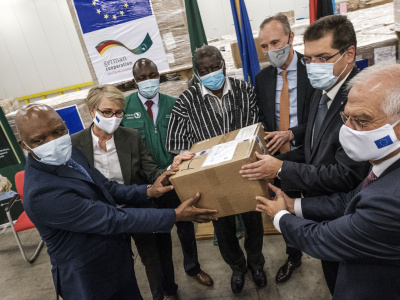
Negotiation of Fair Contracts: For a Sustainable Development of Extractive Industries in Africa
Extractive industries represent strong potential for the economies of many African countries. However, for the last few decades, the benefits of this sector remained very limited for resources-rich countries and, for their local communities, their immense resources have yet to be translated into significant economic and social development.
To optimize these benefits and to ensure a sustainable and well-governed mining sector, many factors have to be considered and among these, it is essential for countries to enter into fair and transparent contracts with their private partners. It is also important to involve technical and legal experts in the negotiation. Created by the African Development Bank as a unique international institution, the African Legal Support Facility (ALSF) assists all African countries in the negotiation of contracts and complex commercial transactions related to the extractive industries, natural resources, mining, oil and energy sectors.
The increase in commodity prices since 2002 has motivated African countries to facilitate access to their natural resources and to open their markets to international investors, offering the latter favorable terms, more often to the detriment of their own mid- and long-term interests. The difficulties for African countries to optimize the revenues are due to various factors, such as corruption, lack of transparency, lack of legal capacity and negotiation skills and lack of human and financial resources. Indeed, African countries lack the capacity to effectively negotiate key legal and financial detail of sophisticated transactions and therefore fail to negotiate favorable provisions. They also often underestimate the implications of such agreed terms.
Fair and good contracts with key provisions
The majority of codes and laws applicable to extractives industries provide for the negotiation and conclusion of contracts for mining investments between states and foreign companies. These contracts are sometimes based on standardized conventions and are required to remain in compliance with the legislation in force in the host country. These investment contracts are at the heart of investment projects as they set out the terms and conditions that will guide foreign investments. However, in many cases the negotiation process and the contents of these contracts are in total distortion with laws and international practices.
The extractive industry and investment agreements are typically complex agreements dealing with various aspects of extractive activities. These include issues such as property rights, royalties and taxes, local content requirements, employment and protection of local communities and citizens, rights and obligations of parties with respect to labour law, human rights, obligations and guarantees of the host state, stabilization clause, dispute resolution and arbitrage, competent jurisdiction and applicable law, amongst others. For the country to maximize revenue and benefits from these extractives activities, they therefore have to anticipate any major issues that may arise as a result of natural resource investments, taking into account potential implications resulting from market changes and ensure that these contracts are legal, balanced and fair.
Transparent process of negotiation and legal capacity
In this context, national authorities have to establish and implement transparent processes when awarding and negotiating key contracts. Indeed, in countries such as Liberia, the law requires contract to be publicly published via specific tools. Countries can even take this further by also involving Parliaments in the process by presenting all key contracts for their consideration and approval.
However, one can argue that these contracts contain highly confidential elements that parties are not keen to share. But in any case, the key point here is that national authorities have to ensure they maintain a well balanced bargaining power vis-à-vis international investors when negotiating each contract, by being well advised by multidisciplinary experts and competent lawyers, in particular since international investors are typically advised by highly competent legal teams.
This also touches upon the issue related to capacity building in contract negotiations in Africa. The issue of strengthening negotiating skills for such contracts is paramount and must therefore be brought to the attention of governments since these agreements are expected to provide the legal framework for major concession agreements, that will most probably engage most host countries for a period of 20 years or more. But unfortunately, in most cases, governments do not have access to good experts to assist them.
ALSF support to African countries in negotiating extractive contracts
All the above-mentioned issues have been clearly identified by African ministers since 2007. In this regard, the African Big Table (“the Big Table”) held in February 2007, co-sponsored by the African Development Bank and the United Nations Economic Commission for Africa, recognised the skills gap for regional member countries in negotiating contracts for extractive natural resources and called for appropriate intervention. The commodity price boom provided a window of opportunity for the continent to address this issue.
The ALSF has therefore been specifically designed to create synergies between the private sector and African countries. All parties have a lot to gain in terms of transparency and good governance in contractual negotiation resulting from the assistance of the ALSF.
Since it became operational in March 2010, the Facility had already registered significant progress in addressing the needs of African countries for which it was established and its Managing Board had already approved more than 15 projects to support countries in various areas (such as Public-Private Partnership projects, agriculture, energy and mining sectors). With respect to the extractive industries, the ALSF is assisting various resources-rich countries such as Rwanda, Kenya and Guinea and has received several other requests, which are currently being evaluated.
When extractive contracts are poorly drafted, national authorities realise at a later stage the negative effects and implications that these agreed contractual provisions may have for the economy at large. A country may therefore respond by delaying the negotiations, or cancelling the investment contract altogether, which will effectively impact on the investment and alter the reputation of the country. The interventions and support of the ALSF to countries on specific projects are therefore aimed at avoiding that such situations occur by fully assisting the country with the services of competent law firms identified by the ALSF and recruited to act as government counsel during the negotiations.
The ALSF supports countries particularly on complex concessions agreements with the private sector. The services range from the analysis of the transaction through the negotiation, including on drafting and signing of agreements. To avoid the cancellation of a transaction, countries may also require assistance to renegotiate an existing agreement: the documentation of the transaction is therefore reviewed to determine if the country has strong legal arguments for new negotiation with the counterpart party. This can only be done through a transparent process involving all parties provided the country did not breach its obligations under the agreement.
The importance of building the negotiating capacity of African countries is also important for the development of the extractive industries, complementary to enacting appropriate laws and regulations. In this context, the Facility is also helping African countries to develop home-grown skills and expertise through specific training, not only provided by the law firms recruited for specific projects, but also through regional training that the ALSF organises for African lawyers. The role of the ALSF is therefore to ensure an effective transfer of knowledge, notably through its assistance and interventions so that countries are, at some stage, able to develop their own legal capacities, knowledge and experiences at the national level.
Coumba Doucouré Ngalani is Legal Counsel at the African Legal Support Facility (ALSF).
This article was published in Great Insights Volume 2, Issue 2 (February-March 2013)


